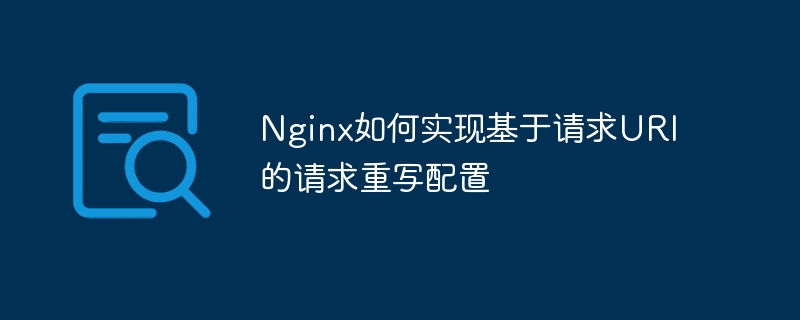

How Nginx implements request rewrite configuration based on request URI,需要具体代码示例
Nginx作为一个高性能的Web服务器和反向代理服务器,常常用于对请求进行重写和转发。在实际应用中,我们经常会遇到需要根据请求的URI对请求进行重写的情况。这篇文章将介绍如何在Nginx中实现基于请求URI的请求重写配置,并提供具体的代码示例。
Nginx中的请求重写主要通过rewrite指令来实现。rewrite指令的基本语法如下:
rewrite regex replacement [flag];
其中,regex表示用于匹配请求URI的正则表达式,replacement表示重写后的URI,flag表示重写的标志。下面将通过具体的例子来介绍如何使用rewrite指令来实现基于请求URI的请求重写配置。
示例一:简单的请求重写
假设我们希望将所有请求URI中包含 "/old/" 的部分替换为 "/new/",我们可以使用如下的Nginx配置:
server { listen 80; server_name example.com; location / { rewrite /old/(.*) /new/$1 last; } }
这段配置的意思是,匹配所有包含 "/old/" 的请求URI,并将其中的 "/old/" 部分替换为 "/new/",然后将重写后的URI继续交给Nginx处理。
示例二:基于条件的请求重写
有时候我们希望根据请求URI中的具体内容来确定重写的方式。比如,我们想要将所有以 ".html" 结尾的请求URI重写为以 ".php" 结尾的URI,可以这样配置Nginx:
server { listen 80; server_name example.com; location / { if ($request_uri ~* .html$) { rewrite ^(.*).html$ $1.php last; } } }
在上面的配置中,使用了if指令来判断请求URI是否以 ".html" 结尾,如果是,则通过rewrite指令将其重写为以 ".php" 结尾的URI。
示例三:多重条件的请求重写
有时候我们需要根据多种条件组合来确定请求的重写方式。比如,我们希望根据请求URI中的不同部分来决定是否进行重写,可以这样配置Nginx:
server { listen 80; server_name example.com; location / { if ($request_uri ~* /category1/) { rewrite ^/category1/(.*) /newcategory/$1 last; } if ($request_uri ~* /category2/) { rewrite ^/category2/(.*) /anothercategory/$1 last; } } }
在这个配置中,根据请求URI中的不同部分进行了多个条件判断,然后根据不同的条件使用rewrite指令进行了相应的重写。
需要注意的是,虽然可以使用if指令来实现条件判断,但是if指令会带来性能上的损失,因此在实际应用中应尽量避免使用if指令。
通过上面的例子,我们可以看到在Nginx中实现基于请求URI的请求重写配置并不复杂,只需要使用rewrite指令和正则表达式进行相关配置即可。当然,在实际的生产环境中,我们还需要综合考虑性能、安全等因素来进行更加复杂的请求重写配置。
总之,Nginx作为一款功能强大的Web服务器和反向代理服务器,其请求重写功能为我们提供了灵活的配置选项,并通过上述的例子,读者可以对Nginx的请求重写功能有一个更加详细的理解。
希望读者可以根据本文的示例和说明,更加灵活地处理Nginx中的请求重写配置,提高Web应用的性能和灵活性。
The above is the detailed content of How Nginx implements request rewrite configuration based on request URI. For more information, please follow other related articles on the PHP Chinese website!




